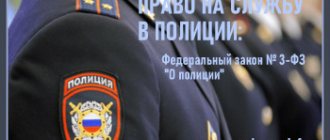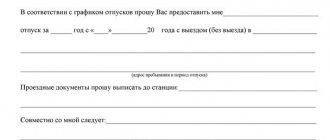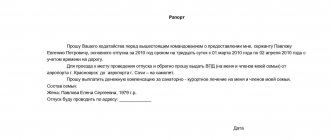Taking into account the intense nature of the work of doctors and nurses, the increased load on them, both physical and psychological, the legislator, in addition to a shortened working week, also provided for some features of granting leave to this category of workers. They mainly relate to the duration of the vacation, but there are also other specifics.
The right of medical workers to additional paid leave
The total duration of basic leave for all medical workers must be at least 28 calendar days a year, like all workers (Article 115 of the Labor Code of the Russian Federation (hereinafter referred to as the Labor Code of the Russian Federation).
The Labor Code of the Russian Federation also generally indicates the right of some categories of medical workers to rest more than the standard 28 days a year and take additional paid leave (Part 3 of Article 350 of the Labor Code of the Russian Federation). The main goal of the legislator establishing such a right is to compensate for the physical and emotional costs of doctors and nurses, and to provide high-quality recuperation after work. As the legislator indicates, the specific duration of such leaves and the categories of health workers entitled to them are determined by acts of the Government of the Russian Federation.
Currently there are only 2 such acts:
- Decree of the Government of the Russian Federation “On the duration of annual additional paid leave for work with harmful and (or) dangerous working conditions provided to certain categories of workers” dated 06.06.2013 No. 482 (hereinafter referred to as Resolution No. 482).
- Decree of the Government of the Russian Federation “On establishing for general practitioners (family doctors) and nurses of general practitioners (family doctors) an annual additional paid 3-day leave for continuous work in these positions” dated December 30, 1998 No. 1588 (hereinafter referred to as Resolution No. 1588) .
Some regulations adopted in Soviet times regarding additional admissions of doctors continue to be in effect, which we will discuss in detail below.
In addition, it must be taken into account that medical workers are also subject to the general norms of the Labor Code of the Russian Federation on additional leaves, for example, for workers with irregular working hours, typical for doctors and nurses, for workers in the Far North, etc. (Article 116 of the Labor Code of the Russian Federation).
Based on this, we can conditionally distinguish 4 categories of doctors who have the right to apply for additional leave:
- workers in dangerous and harmful conditions;
- workers in special conditions;
- working long hours;
- working in the Far North and similar areas.
Let's look at them in more detail next.
Additional leave for health workers with harmful and dangerous working conditions
Government Decree No. 482 establishes categories of doctors who should be granted leave in a larger amount than other workers in this field, due to dangerous and harmful working conditions. The right of some categories of medical workers to additional leave is duplicated in federal laws. For example, Art. 22 of the Law of the Russian Federation “On psychiatric care and guarantees of the rights of citizens during its provision” dated July 2, 1992 No. 3185-1 names the right to additional annual paid leave among the guarantees for persons providing professional psychiatric care.
In the table below we have presented a list of doctors and other healthcare workers who have the right to rest longer than usual due to the harmfulness and danger of working conditions in accordance with Resolution No. 482, and the corresponding duration of leave, which varies from 14 to 35 days.
| Category of health workers | Position of health workers | Duration of additional leave |
| Mental health workers | Doctor (including managers and their deputies, whose job responsibilities include providing psychiatric care and who have irregular working hours), nursing and junior medical personnel (except for medical statisticians), medical psychologist | 35 |
| Chief nurse | 28 | |
| Clinical laboratory diagnostics doctor, laboratory doctor (including laboratory director), laboratory assistant, medical laboratory technician (paramedic laboratory assistant), laboratory orderly | 21 | |
| Dietitian, dietary nurse, medical registrar, hostess sister | 14 | |
| Nurse-housekeeper directly involved in patient care | 35 | |
| Health workers providing anti-tuberculosis care | Doctor (including doctors holding a managerial position, whose job responsibilities include direct participation in the provision of anti-tuberculosis care), nursing and junior medical personnel, medical psychologist | 14 |
| A phthisiatrician who systematically performs X-ray diagnostic studies | 21 | |
| Health workers providing medical care to HIV-infected people | Doctor (including doctors holding a managerial position, whose job responsibilities include diagnosis and treatment of HIV-infected people), nursing staff performing diagnosis and treatment of HIV-infected people, medical psychologist | 14 |
| Clinical laboratory diagnostics doctor, laboratory doctor (including laboratory director), laboratory assistant, medical laboratory technician (paramedic laboratory assistant), laboratory orderly | ||
| Junior medical staff caring for HIV-infected people | ||
| Persons whose work involves materials containing the human immunodeficiency virus |
This list does not mean that only these categories of doctors have the right to count on additional days of vacation. It should not be forgotten that in accordance with Art. 117 of the Labor Code of the Russian Federation, any health workers working in harmful or dangerous conditions have the right to additional leave of at least 7 days. For example, the number of workers with harmful and dangerous working conditions certainly includes radiologists, infectious disease doctors, etc.
The harmfulness of working conditions is determined not only by the specialization of a physician or the inclusion of his profession or position in any lists of hazardous industries, but also, first of all, by a special assessment of working conditions (Part 1 of Article 117 of the Labor Code of the Russian Federation). This position is shared by the Supreme Court of the Russian Federation (decision dated January 14, 2013 No. AKPI12-1570).
Please note that if a medical worker is one of those doctors who are entitled to additional leave by a special resolution of the Government of the Russian Federation, for example, a psychiatrist, then his right to extra days of rest does not depend on the results of a special labor assessment (see, for example, the appeal ruling of the Supreme Court of the Republic of Karelia dated March 11, 2016 in case No. 33-719/2016).
When granting additional leave due to harmful and dangerous working conditions, it is not necessary that the employee’s employment be full-time, that is, leave is due even if the worker is working part-time.
Separately, we emphasize that the above-mentioned duration of additional leave is only minimal and can be increased by a collective or labor agreement, or internal labor regulations.
Working hours of nurses
In connection with the performance of work of increased complexity and responsibility by nursing personnel, the legislator provides additional guarantees for this category of workers in the form of a shortened working week and extended vacations.
The permissible workload for nurses should not exceed 39 hours per week, as for all health workers (Part 1 of Article 350 of the Labor Code of the Russian Federation). However, this working time may be lower depending on the field of medicine, the specifics of the work and the presence of harmful and dangerous factors.
These features are established by the Decree of the Government of the Russian Federation “On the working hours of medical workers depending on their position and (or) specialty” dated February 14, 2003 No. 101 (Appendices 1, 2, 3).
| Working hours | Medical activity (specialty) |
| 36 hours a week | Work in infectious diseases and dermatovenerological departments Work in medical institutions (hospitals, centers, departments, wards) on the prevention and control of AIDS and infectious diseases Work in leper colonies Medical care for patients with mental illness Medical assistance, service and care for disabled children, mentally retarded children, with central nervous system lesions Work related to hydrogen sulfide and sulfur baths, mud therapy Examination of citizens suffering from mental illness Work at ambulance stations Virologists, bacteriologists, epidemiologists when working with especially dangerous infections Work in anti-plague institutions Work at blood transfusion stations Work in medical correctional institutions for compulsory treatment of persons with drug addiction and alcoholism Work in pressure chambers, caissons, boxes; Microsurgery Working with X-rays and radiation therapy Working with neural sources, linear accelerators, open radioactive sources |
| 33 hours per week | Full-time work on ultra-short wave generators with power above 200 W Dentistry |
| 30 hours per week | Work with tuberculosis patients, including their examination Work in pathological-anatomical institutions and departments Forensic examination Activities related to the procurement and preservation of cadaveric blood Working with gamma radiation, x-rays, fluorography |
| 24 hours a week | Gamma therapy and experimental gamma irradiation with gamma drugs in radiomanipulation rooms and laboratories |
When determining the length of working hours for nurses, the employer must take into account not only the sphere of work, but also the actual working conditions, which are determined based on the results of a special assessment of working conditions (Part 2 of Article 92 of the Labor Code of the Russian Federation).
Do not forget that nurses are also subject to the general grounds for reducing working hours provided for in Art. 92 Labor Code of the Russian Federation:
- workers aged 16 to 18 years, as well as disabled people of groups I and II can be employed no more than 35 hours per week;
- workers whose working conditions, as a result of a special assessment, are classified as hazardous working conditions of the 3rd or 4th degree or hazardous working conditions, and women working in rural areas should not work more than 36 hours a week (Article 263.1 of the Labor Code of the Russian Federation).
Nurses can work a five-day work week, as well as irregular hours, shifts and home duty. When working in shifts, the length of the working week should not exceed the norm (39 hours or less); with summarized accounting, you need to comply with the norm for the accounting period (month, quarter, year); the duration of rest between shifts must be no less than a double shift, and weekly continuous rest must be at least 42 hours (Article 110 of the Labor Code of the Russian Federation).
Working with irregular working hours (Article 191 of the Labor Code of the Russian Federation) is allowed, despite the reduced working hours. However, the condition of irregularity must be spelled out in the employment contract. In addition, the employer is obliged to approve the list of positions with irregular working hours in a local regulation or in a collective agreement and take into account the opinion of the trade union, if any. Employees employed in jobs with harmful or dangerous working conditions and pregnant women must not be hired to work irregular hours.
A specific form of employment for nurses is the so-called duty at home (Parts 4, 5, Article 350 of the Labor Code of the Russian Federation). It consists in the fact that the nurse is at home, but is not fully resting, but is waiting for a call from the patient and is ready to leave at any moment to provide emergency or emergency medical care.
Employees can be involved in such duties only with their consent.
Recording of working time when on duty at home is carried out in accordance with the Regulations approved by Order of the Ministry of Health of Russia dated 04/02/2014 No. 148n (hereinafter referred to as the Regulations). According to Part 6 of Art. 350 of the Labor Code of the Russian Federation, clause 3 of the Regulation, when the employer takes into account working time, each hour of duty at home is taken into account as half an hour of work in a medical organization; travel time and time to provide assistance are like an hour of work. The total working hours must remain reduced and not exceed the maximum for a given employee.
Call waiting time is considered working time and must be paid even if the call is not received. Failure to include call waiting time during working hours is a violation on the part of the employer (see, for example, the appeal ruling of the Krasnoyarsk Regional Court dated May 27, 2015 in case No. 33-5381/2015).
For work at home, the employer must introduce summarized recording of working time (clause 2 of the Regulations). To organize it, it is necessary to introduce appropriate provisions into the internal labor regulations and the employment contract with the employee, approve the duty schedule, familiarize health workers with it and take into account the opinion of the elected representative body, if any. With summarized accounting, it is possible not to observe the duration of working hours per day and week. The main thing is to comply with the general norm for the accounting period, which can range from 1 month to a year, and if the work is associated with harmful or dangerous conditions, then up to 3 months (Part 1 of Article 104 of the Labor Code of the Russian Federation).
If a nurse is overworked, then work performed overtime must be paid at an increased rate (Article 96 of the Labor Code of the Russian Federation). The same rule applies if the nurse is forced to go to work on a weekend or holiday. However, when working on a shift schedule, if the shift falls on a holiday or day off, it is paid at the usual rate. If a nurse goes outside of her shift due to work needs, then the payment should be increased.
Payment for night hours should always be made at an increased rate - at least 20% higher than the usual payment (Resolution of the Government of the Russian Federation of July 22, 2008 No. 554).
Additional leave for medical workers with special working conditions
According to Art. 118 of the Labor Code of the Russian Federation, employees with special working conditions also have the right to additional paid leave. A unified list of such workers in the field of medicine and healthcare has not yet been established by the Government of the Russian Federation. The only ones who are mentioned separately in government acts are general practitioners (family doctors) and general practice nurses (Resolution of the Government of the Russian Federation of December 30, 1998 No. 1588 “On establishing general practitioners (family doctors) and nurses as general practitioners (family doctors) ) annual additional paid 3-day leave for continuous work in these positions"). They are entitled to an additional leave of 3 days, but only if they work continuously in these positions for 3 years.
This special experience includes work in the positions of local doctors - therapists, local doctors - pediatricians of territorial areas and nurses of therapeutic and pediatric territorial areas.
It is noteworthy that at present a number of regulations from the Soviet era continue to be in force, which also establish the right of certain categories of physicians to an additional leave of 3 days. These acts are valid to the extent that they do not contradict the Labor Code of the Russian Federation. However, managers of medical organizations sometimes “forget” about the presence of these documents. We are talking about the following categories of medical workers:
- Senior doctors of ambulance and emergency medical care stations (departments), heads of therapeutic and pediatric departments of polyclinics, departmental clinics, district nurses of therapeutic and pediatric territorial areas, senior paramedics of ambulance and emergency medical care substations, nursing staff for receiving calls and transferring them to field teams (item. 5 Resolution of the Central Committee of the CPSU, Council of Ministers of the USSR, All-Union Central Council of Trade Unions dated October 16, 1986 No. 1240 “On increasing wages of healthcare and social security workers”).
- Doctors of local hospitals and outpatient clinics in rural areas, local therapists and pediatricians of territorial areas of city clinics, mobile teams of stations and departments of emergency and emergency medical care, air ambulance stations and departments of planned and emergency advisory assistance for continuous work in these institutions and in territorial areas over three years (clause 32 of the Resolution of the Central Committee of the CPSU and the Council of Ministers of the USSR dated September 22, 1977 No. 870 “On measures to further improve public health”).
- Paramedics working since 01/01/1991 in medical positions in territorial therapeutic and pediatric areas in polyclinics (outpatient departments), paramedics in medical outpatient clinics and medical and obstetric centers, with continuous work in these positions for 3 years (Resolution of the CPSU Central Committee and the Council of Ministers of the RSFSR dated January 17, 1991 No. 27 “On measures to implement the proposals of the Committee of the Supreme Council of the RSFSR on health protection, social security and physical culture and the Central Committee of the trade union of healthcare workers of the RSFSR to improve the socio-economic situation in the healthcare system of the Russian Federation”).
Additional leave for medical workers with irregular working hours.
Medical workers working under the terms of an employment contract on an irregular schedule also have the right to receive additional paid leave on a general basis. Its duration is determined by the employer in the internal labor regulations or by a collective agreement. However, a minimum of 3 days must be observed (Article 119 of the Labor Code of the Russian Federation).
As a rule, the amount of additional leave depends on how busy the health worker’s schedule is and how often he has to go to the workplace when called by the employer. At the same time, if the terms of the employment contract specifically provide for an irregular working day, then additional leave is granted even if the health worker has never been involved in work outside the normal working day. It cannot be calculated in proportion to the time worked. This opinion was expressed by the Ministry of Labor of Russia (Letter No. 14-2/B-761 dated August 18, 2017) and is supported by judicial practice (see, for example, the Appeal ruling of the Novosibirsk Regional Court dated November 9, 2017 in case No. 33-10778/2017).
Disciplinary liability of nurses for violation of labor duties
Failure by a nurse to fulfill her work duties through her fault without good reason entails disciplinary liability (Part 1 of Article 192 of the Labor Code of the Russian Federation). The employer has the right to apply only three types of disciplinary sanctions: reprimand, reprimand and dismissal for special reasons. No other disciplinary measures (fine, deprivation of part of their salary, etc.) can be applied to nurses; this is not established by special regulations.
Before applying a penalty, the manager must ask the employee to give written explanations about the violation committed (Article 193 of the Labor Code of the Russian Federation). In the absence of explanations, a report is drawn up. Disciplinary action can be taken within 1 month from the date of discovery of the violation. Only one disciplinary sanction can be imposed for one offense.
Dismissal of a nurse, the most severe disciplinary measure, can result from violations such as:
a) truancy. Absenteeism means absence from the workplace without good reason throughout the entire working day (shift), regardless of its duration, or absence from the workplace without good reason for more than four hours in a row during the working day (shift);
b) appearing at the workplace in a state of alcohol, drug or other toxic intoxication;
c) disclosure of medical confidentiality that became known to the nurse in connection with the performance of her work duties. The nurse’s obligation to maintain medical confidentiality is provided for in paragraph 2 of Art. 73 of Law No. 323-FZ. Please note that medical confidentiality constitutes not only the patient’s diagnosis, but also any data about the state of his health and even the very fact of seeking medical help.
d) committing theft at the place of work, embezzlement of someone else’s property, its intentional destruction or damage, provided that this is established by a court verdict (resolution) that has entered into legal force;
e) violation of labor protection requirements, if it entailed serious consequences or created a threat of such consequences
Among the special violations of labor discipline of nurses, for which the employer has the right to impose disciplinary sanctions, it should be noted:
- refusal to undergo a medical examination, which is mandatory for admission to work;
- accepting gifts and funds from companies that develop, produce or sell medicines, medical devices, concluding agreements with them on prescribing or recommending these products to patients (Article 74 of Law No. 323-FZ, letter of the Russian Academy of Medical Sciences dated February 29, 2012 No. 408/05-05 “On prohibitions and restrictions for health workers”).
The procedure for granting leave to a health worker
The right to leave, both main and additional, arises for a health worker after 6 months of continuous work at a given workplace (Article 122 of the Labor Code of the Russian Federation). At the same time, the length of service that gives the right to annual additional paid leave for work with harmful and (or) dangerous working conditions includes only the time actually worked in the relevant conditions.
Both basic and additional leave are provided to health workers based on the organization’s approved vacation schedule. Such a schedule is drawn up and approved annually by the head of the medical organization before December 17. 2 weeks before the employee goes on vacation, the manager issues an order, introduces it to the employee against signature, and prepares the calculation of vacation pay.
As a general rule, the main leave is summed up with additional leave (Part 2 of Article 120 of the Labor Code of the Russian Federation). However, by agreement between the employer and the employee, both vacations can be divided into parts (Article 125 of the Labor Code of the Russian Federation), provided that one of the parts of the vacation should not be less than 14 days. For example, a TB doctor has the right to rest for 28 days (main leave) plus 21 days (additional leave). He has the right to take 49 days off at a time, or he can break the vacation into parts, for example, rest for 30 days in the summer, and divide the remaining 19 days: take 10 days in September and 9 days in May.
Note! If a physician has the right to additional rest for several reasons, for example, as a worker in the Far North, as a psychiatrist, and for irregular working hours, then the additional days of rest are summed up.
A medical organization does not have the right to refuse a doctor additional leave if he has grounds. Otherwise, she will face administrative liability under Parts 1 and 2 of Art. 5.27, 5.31 of the Code of Administrative Offenses of the Russian Federation in the form of a fine, suspension of the activities of a medical organization or disqualification of the manager.
Both main and additional leave can be postponed to the next year due to personal circumstances and agreement with the employer, as well as without fail in the following cases (Article 124 of the Labor Code of the Russian Federation):
- in case of temporary disability of the employee;
- in the event that an employee performs state duties during his annual paid leave, if for this purpose the labor legislation provides for exemption from work;
- if the employee’s absence from work may affect the normal work process of the organization;
- in other cases provided for by labor legislation and local regulations.
At the same time, failure to provide annual paid leave for two years in a row is prohibited, as well as failure to provide annual paid leave to employees under the age of 18 and employees engaged in work with harmful and (or) dangerous working conditions (Part 4 of Article 124 of the Labor Code of the Russian Federation) .
Vacation of doctors
The additional rest period for doctors is as follows:
- doctors conducting general practice, more than three years - 3 days;
- employed in the field of psychiatry - 35 days;
- nutritionists, employees of psychiatric support centers and those involved in serving patients with tuberculosis and HIV infections - 14 days;
- laboratory assistants or employees of HIV diagnostic centers - 14 days;
- TB specialists and radiologists involved in anti-tuberculosis activities - 21 days;
- laboratory doctors in clinical laboratories combining work with providing psychiatric care - 21 days.
Vacation pay calculation
Vacation pay must be paid to the medical worker no later than 3 days before the start of the vacation. They are calculated according to the general scheme for all workers: the average daily earnings must be multiplied by the number of calendar days of vacation.
Average daily earnings, in turn, are calculated as the product of the base for vacation pay (salaries for days worked) and the number of days worked over the last 12 months (all days when the employee was registered with the organization are included, including holidays and weekends).
The following are not included in the base for calculating vacation pay:
- sick leave;
- business trips;
- vacation pay;
- material assistance.
During the coronavirus epidemic, doctors who directly provide care to patients with Covid-19 receive additional incentive payments (RF Government Decree No. 415 and 484). Should such payments be taken into account when calculating vacation pay? The answer is clear - yes, of course.
In accordance with Decree of the Government of the Russian Federation dated 06/08/2020 No. 998, Decree of the Government of the Russian Federation dated 06/10/2020 No. 1792-r, more than 5 billion rubles were allocated from the reserve fund to pay medical and other employees increased vacation pay or compensation for the vacation from which they were forced to cancel due to the coronavirus epidemic. At the same time, a procedure was approved for providing regions with targeted interbudgetary transfers in order to co-finance costs associated with paying vacations and paying compensation for unused vacations.
This rule applies not only to doctors and nurses, but also to junior medical staff, ambulance drivers - all workers who receive incentive bonuses for special working conditions when working with coronavirus.
You should pay attention to this nuance: in accordance with the regulations of the USSR, some categories of medical personnel are granted additional leave in working days, and not in calendar days. To correctly calculate vacation, it is necessary to convert working days to calendar days (see letter of the Ministry of Labor of Russia dated 02/01/2002 No. 625-ВВ).
To clearly understand the mechanism for calculating vacation pay, we will give an example.
The psychiatrist goes on vacation from October 1, 2020 for 14 days. For the billing period from October 1, 2019 to September 30, 2020, he received a salary of 450,000 rubles and vacation pay of 34,000 rubles. and sick leave 18,257 rubles. The employee was on vacation for 14 days from 07/04/2020 to 07/17/2020 and was sick for 7 days from 02/06/2020 to 02/12/2020.
In the billing period, 10 months were fully worked out - 293 days. (10 months X 29.3).
The number of days for calculating vacation pay for July 2021 is 16.07 days. ((31 days - 14 days) / 31 days X 29.3), for February 2021 - 22.23 days. ((29 days - 7 days) / 29 days X 29.3).
The total number of days worked in the billing period is 331.3 days. (293 days + 16.07 days + 22.23 days).
The base for calculating vacation pay is 450,000 rubles. Vacation and sick pay are not included.
Average daily earnings – 1,358.29 rubles. (RUB 450,000 / 331.3 days).
The amount of vacation pay is 19,016.06 rubles. (RUB 1,358.29 x 14 days).
Cash compensation for unused vacation
Despite the legally enshrined opportunity to rest more than average, doctors and nurses often work in such a busy schedule that they simply do not have time to use all the vacation days they are entitled to. In this case, you can replace part of the vacation exceeding 28 calendar days with monetary compensation (Article 126 of the Labor Code of the Russian Federation). To do this, you need a free-form application from the employee addressed to the head of the medical organization.
Please note that current labor legislation prohibits the replacement of annual paid leave with monetary compensation for employees under 18 years of age, pregnant women, and additional allowances for employees engaged in work with harmful and (or) dangerous working conditions.
The right to receive monetary compensation for unused vacation also arises for all medical workers upon dismissal (Article 127 of the Labor Code of the Russian Federation).
Compensation is calculated using a simple scheme by multiplying the average daily earnings by the number of days of unused vacation.
Levels of activity
The legislation identifies 4 levels that affect the provision of additional vacation days:
- First level . It is considered the easiest and leads to minor changes in a person’s health and mental state. And it is easy to restore his condition by stopping this work activity.
- Second level . In this case, there are certain factors that can cause chronic diseases that cannot be changed in a positive direction. But the negative result affects only with long-term work activity of more than 15 years.
- Third level . Such work leads to significant changes in a person’s health, as well as the loss of his ability to work. The employee feels the first symptoms already during short-term work.
- Fourth level . It is considered the most dangerous, which necessarily leads to loss of performance without the possibility of recovery.
When determining the level of working conditions, harmful factors and their effect on the body are of great importance. These factors include:
- Physical . What we feel: dust, dirt, radiation, lighting.
- Biological . Microorganisms, bacteria.
- Chemical . These are special substances that have an effect on the body.
- Labor . They are related to the length of working hours, as well as the general moral or physical stress of the work performed.
By comparing these factors, the commission determines the level of working conditions of the health worker.
Study leave for a medical worker
While working, doctors, nurses and paramedics often continue their studies, receiving secondary vocational or higher education, or enroll in graduate school. Sometimes their employer sends them for training or advanced training. To successfully study and pass the state final certification, a health worker requires study leave.
The table below shows when an employer is obliged to provide a health worker with additional paid educational leave and for what duration (Part 1 of Article 177 of the Labor Code of the Russian Federation).
| Type of education | Form of study | Grounds for granting leave and its duration |
| General basic | Part-time | State final certification – 9 days (Article 176 of the Labor Code of the Russian Federation) |
| Overall average | Part-time | State final certification – 22 days (Article 176 of the Labor Code of the Russian Federation) |
| Professional secondary | Part-time or part-time | Interim certification (Article 174 of the Labor Code of the Russian Federation) In 1st and 2nd courses – 30 days per academic year In the 3rd and further courses – 40 days per academic year State final certification – no more than 2 months (Article 174 of the Labor Code of the Russian Federation) |
| Professional higher education (bachelor's, master's, specialist's) | Part-time or part-time | Interim certification (Article 173 of the Labor Code of the Russian Federation) In 1st and 2nd courses – 40 days per academic year For 3 and beyond – 50 days per school year |
| Professional higher education (postgraduate studies, residency, assistantship-internship) | Correspondence | 30 days during the calendar year plus time for travel from the place of work to the place of training and back (Article 173.1 of the Labor Code of the Russian Federation) Admission to defend a dissertation for an academic degree (Article 173.1 of the Labor Code of the Russian Federation) for a candidate of sciences – 3 months; Doctor of Science – 6 months |
Study leave is provided only at the main place of work (Part 1 of Article 287 of the Labor Code of the Russian Federation) and only at one place of study (Article 177 of the Labor Code of the Russian Federation). The basis for granting leave at the place of work is a certificate of summons from an educational organization (Part 4 of Article 177 of the Labor Code of the Russian Federation). The certificate form was approved by order of the Ministry of Education and Science of Russia dated December 19, 2013 No. 1368.
However, in a number of cases, the employer is not obliged to provide paid study leave to the doctor, but may provide leave at his own expense, without pay. For example, if the training has nothing to do with the professional activity of a doctor. One of the court cases involved a case where a doctor asked his employer for study leave while studying law. The court recognized that the employer was right in refusing to give the medical worker paid leave (see the appeal ruling of the judicial panel for civil cases of the Krasnodar Regional Court dated February 25, 2016 in case No. 33–2827/2016).
Financial responsibility of nurses
In the course of their work, nursing staff deal with expensive medical equipment, medicines and other material assets. The nurse's responsibilities include caring for them. In case of damage or loss of such property, the nurse may be held liable in accordance with Art. 241 of the Labor Code of the Russian Federation and will be obliged to compensate for direct actual damage caused through her fault, within the limits of the average salary for 1 month. Thus, the nurse bears so-called limited financial liability.
A medical organization has the right to enter into an agreement with a senior nurse on full financial liability (see Resolution of the Ministry of Labor of the Russian Federation dated December 31, 2002 No. 85), that is, impose on her the obligation, in the event of loss, destruction or damage to the property entrusted to her, to compensate for the damage caused in full.
***
As we can see, the legislator distinguishes medical workers from the general mass of workers, establishing the right of some categories to additional paid leave. In addition, general labor legislation also applies to doctors, giving the right to more rest to those who work in difficult climatic, harmful, dangerous or other special conditions.
Problems of legal regulation include the absence of a single regulatory act of the Government of the Russian Federation, which would establish additional leave for all categories of physicians, including those mentioned in documents from the times of the USSR.











